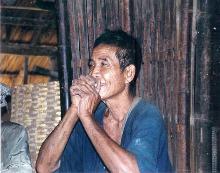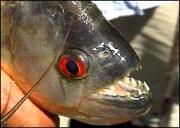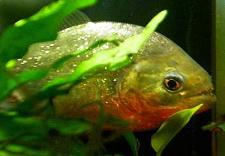

Houston Chronicle Publishing Company Division (“The Chronicle”), © 1985 - 2002
Hearst Newspapers Partnership, L.P.
All rights reserved.
| This article originally appeared in |
||||||||||||
 |
||||||||||||
| Piranha meat: It can take a bite out of what ails you |
||||||||||||
 |
||||||||||||
| © 1998 Houston Chronicle Houston Chronicle Publishing Company Division (“The Chronicle”), © 1985 - 2002 Hearst Newspapers Partnership, L.P. All rights reserved. |
||||||||||||
| After 5-hour trip into jungle, I'm at home with witch doctor The route to the home of the witch doctor known as Flor is long and difficult, but it doesn't discourage visitors. Inside his wooden hut, a sweaty five hours by dugout canoe and foot from the Amazon jungle city of Pucallpa, Flor brews his mysterious potions and medicines for an average of three "clients" a day. "People," he said plainly, "they want what I have." They want it for dozens of reasons. Flor boasts cures for maladies ranging from infertility to baldness, from alcoholism to poor night vision. During a recent visit, Flor told me he could cure me of whatever ailed me. `"You have all your hair," he said, stroking his chin. "Any fertility problems?" I told him I was single, but he wasn't deterred. "Do you have problems shooting an arrow straight?" he asked, a little more desperate. "Do you make too much noise when you walk through the jungle? Do your feet sweat when you sleep?" Flor wasn't what I thought an Amazon witch doctor would be. He wasn't dressed in bright robes, his face wasn't painted in cryptic patterns. In fact, he was virtually indistinguishable from the 60 or so people in the nearby village of Nuevo Destino -- Spanish for New Destiny -- with his earth-tone clothes and high, Indian cheekbones. His Spanish was fairly articulate, given that it wasn't his native language. The Shapibo Indian language is spoken by most people in the area. The route to his hut included a maze of minor river tributaries -- some of which had to be blazed by breaking off or slipping under branches from fast-growing Amazon trees -- and then a muddy, hourlong walk along an overgrown path. Flor's hut, on the southern edge of Nuevo Destino, looks as if it grew out of the land around it. Weeds sprouted between the unevenly spaced floor and the wooden-and-palm-thatched roof seemed to absorb the tube of smoke rising up from the flame Flor used to heat the potion he was making for me. The brew he concocted for me included an ounce or two of piranha meat along with a ground-up mixture twigs, herbs, powders and some drops from an odd assortment of bottles that Flor kept on a shelf with the skull of a huge Caiman. The gritty potion tasted bitter, but Flor and my guide urged me to drink it down as they chatted in Shapibo. After I took a few hesitant sips, Flor took the clay pot back and smiled a toothless smile. He declared me almost cured. Of what? I asked Flor and my guide. They looked at me as if I should have perhaps asked for a cure for being dimwitted. A few seconds passed, and Flor spoke slowly. "You will find love," he said, "within 30 days." That time has nearly passed, but I haven't given up hope. --By Eric J. Lyman |



| July 17, 1998 - Page C-1 |